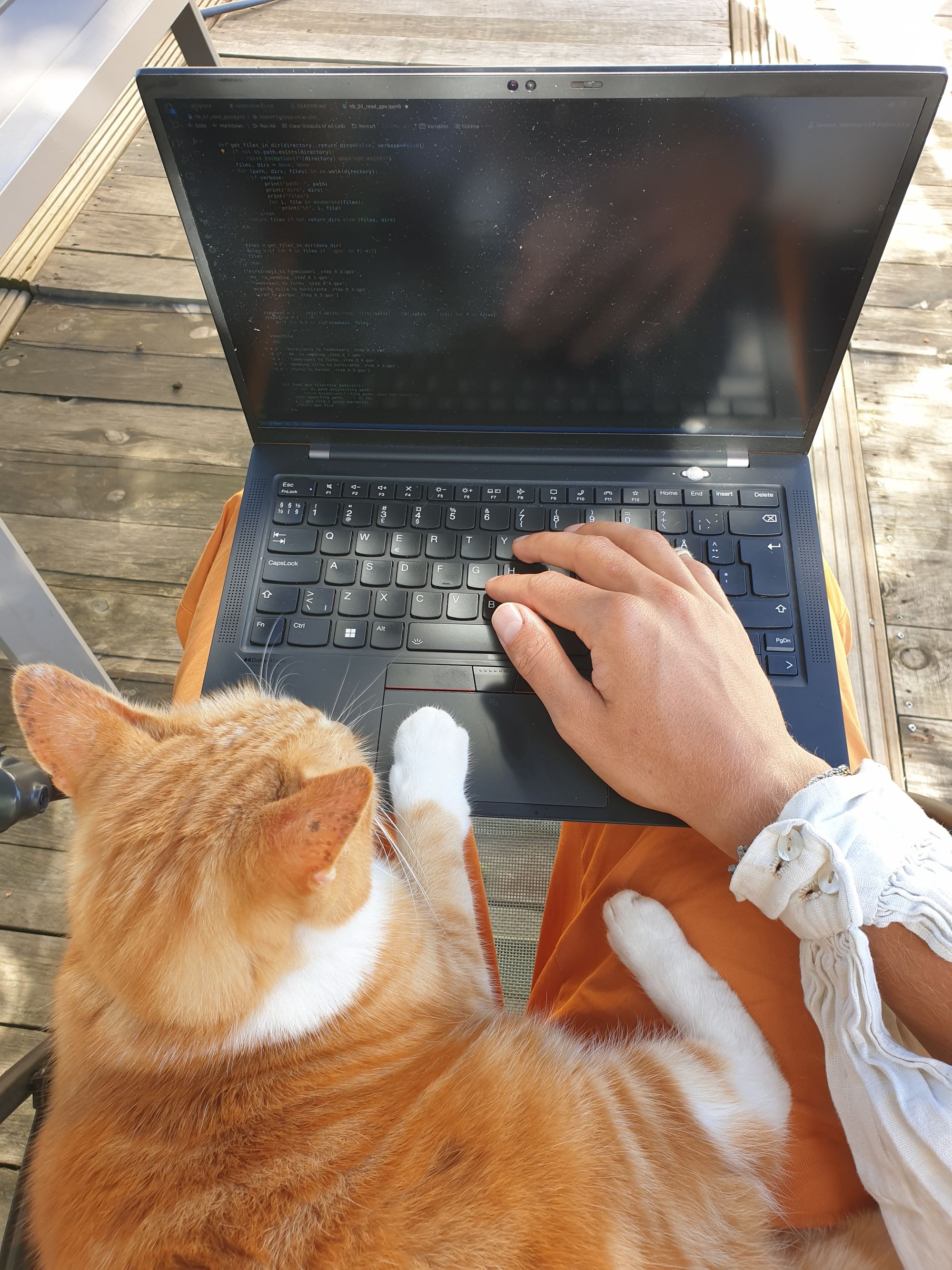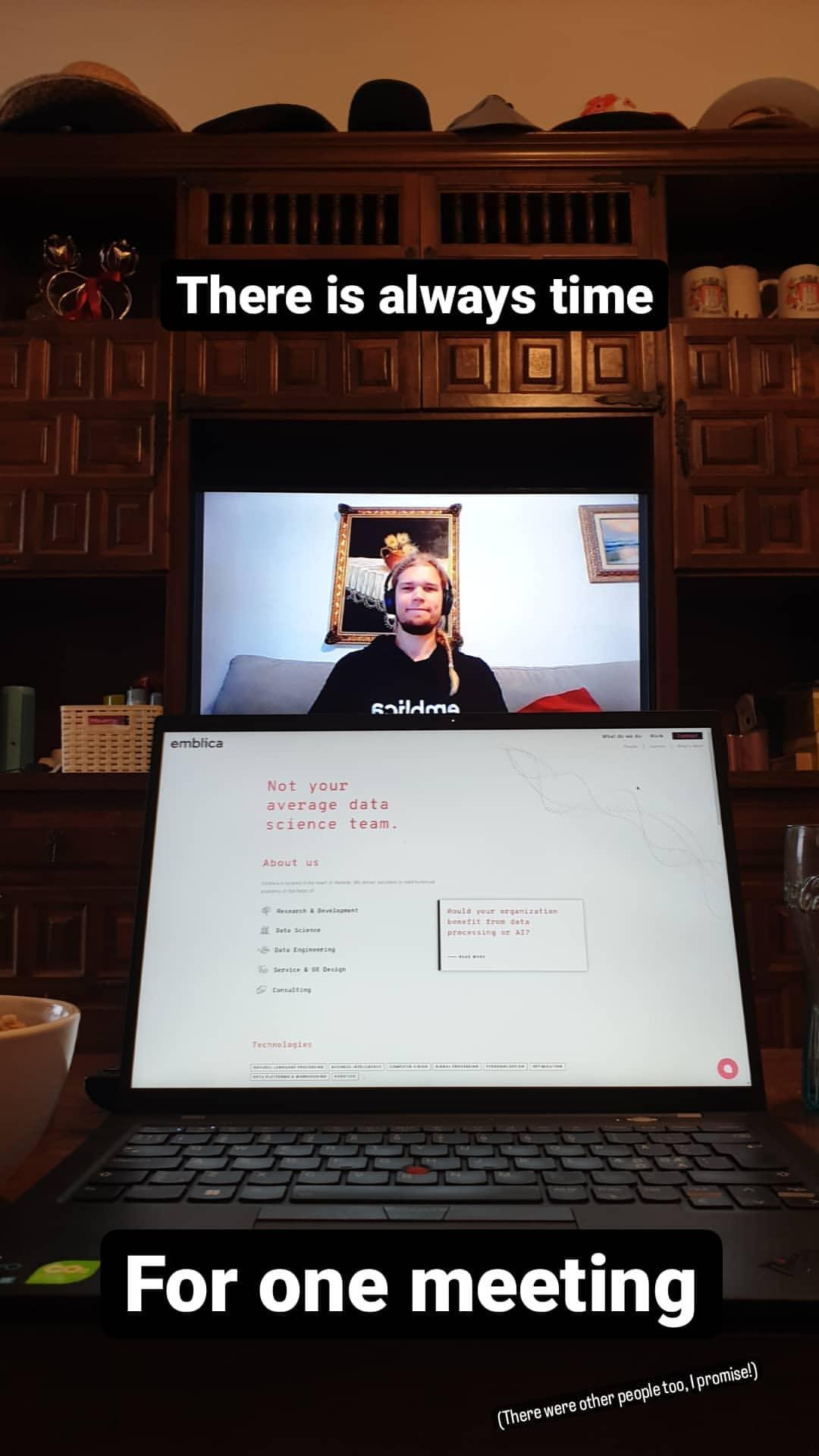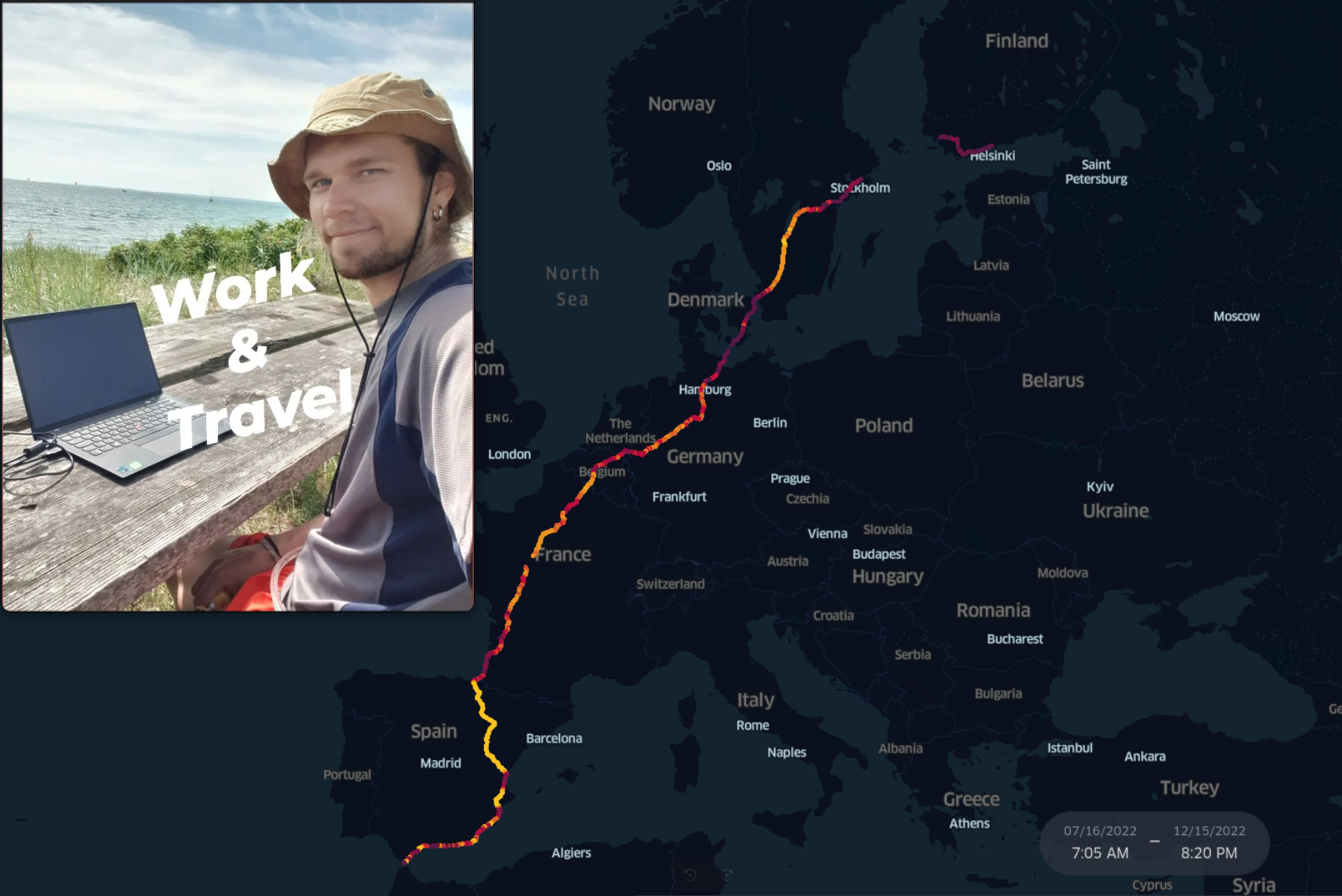Lyhyesti suomeksi: Kun yritys sanoo “tukevansa etätyöskentelyä”, se voi tarkoittaa hyvin eri asioita. Tässä blogissa Anna haastattelee Suomesta Marokkoon pyöräillyttä varatoimistusjohtajaamme Viliä.
Over the past three years, remote working has been discussed a lot. For an organization like Emblica, remote working was nothing new when the Covid-19 pandemic hit Finland in early 2020. Once the pandemic had forced many organizations to take a leap in their digitalization and remote work practices, consulting roles are now widely expected to allow hybrid (remote + on-site) work. However, the reality of what hybrid work looks like varies a lot.
To push the limits of remote work, and as a personal experiment, Emblica's vice CEO Vili cycled from North Europe to Africa while working full-time. Our People Happiness Officer Anna interviewed Vili regarding his personal experiences of this remote-remote work experiment.
Hi Vili! Thanks for joining me today to discuss remote work experiences at Emblica. You had a little cycling trip last year, could you tell us about it?
Yes, we decided to try an unusual remote-remote working setup last year. By remote-remote working, I mean someone working remotely from somewhere else than their default remote working location, which would be usually their home. I had an idea to cycle to Africa while simultaneously working full-time, and we decided to give it a go.

How did you come up with the idea to cycle to Africa? How far away is that from Helsinki?
Well, the previous year, someone asked me how I would get to my volunteering post in Namibia, and asked if I would cycle there. I thought they were crazy, and I told them that. But the idea had been planted, so a year or so later, I decided to act on it and cycle the 5000km from Finland to North Africa via ten different countries. Which probably makes me the crazy one.
Yes, it sort of does. To clarify, we don't push or expect our employees to be like this. Also, we want to ensure everyone's well-being is taken care of from all aspects, also while remote working. So how did you plan and prepare for the trip in advance?
The biggest part of the planning was organizing projects so that the trip would not bother customers and our internal team dynamics. It took me half a year to sort these out. This was really helpful since it motivated me to document certain things better and share responsibilities. The remote-remote working equipment was light: a laptop, a charger, a hard drive, and some clothes appropriate for visiting an office somewhere along the way. You don't need more than that, although you need to look after your work ergonomics when working in different locations with often non-optimal tables and chairs.
I didn't really prepare for the cycling, but I figured that I will learn along the way. I originally estimated the duration and route by checking a map app for a route from Finland to South Spain and dividing that by 100km, which was my guess for a daily cycling distance. Then add the work days between the cycling weekends and tada, I had my estimate of 5 months on the road.
How long did it take you in the end?
Exactly 5 months, by the day. But only because I needed to make it, not because it was an easy pace.
Well, you reap what you sow. But five months is a long time. How did not seeing your colleagues affect your experience and your work?
I did miss the team for sure. You had so many great activities and fun times without me! But pair coding and working together on the same topic were not affected almost at all. Hybrid work is such an ingrained part of our everyday routine. However, brainstorming and throwing ideas around spontaneously did decrease a lot. When you meet remotely, you talk business and stay on topic. There is much less room to share random thoughts about recent advances in ML when you're not physically in the same space sharing the short empty moments between work tasks.
So working remotely hurts innovation?
On the one hand, yes, you tend to share and brainstorm less. But on the other hand, when you are far away, you can see the big picture better. Just make sure you have time for big thoughts, the ideas that really create change. Sometimes I didn't manage to have that time, but it had a lot to do with the practical issue of me trying to survive across the continent.

Were there any other practical things that made things difficult regarding work?
Working remotely went surprisingly smoothly. Of course, you need basic things like electricity, an internet connection, and food to not lose time. Because I was crossing Europe, the electricity for charging my devices and 4G for a decent internet connection was guaranteed in the cities over 98% of the time. Honestly, organizing a lunch without spending half a day moving around the new city proved the most difficult thing.
Well, as you know, sometimes organizing a team lunch can also be challenging when working in the office! Great to hear things went smoothly. How about the data privacy and security topics, how did you cover this part?
The most important decision, during your travel, regarding privacy and data security is where you work. Some meetings you can have in a café for sure, but most of the client work and anything HR-related needs to happen behind closed doors. In practice, that meant having a private room accessible for the whole day.
Where were you staying? What kind of accommodations would you recommend for a remote worker?
I was mostly staying in AirBnB's during the work week mainly for three reasons: cooking and doing laundry is so much faster when you don't need always to leave your flat; you get a calm, private space for work calls; and the wifi is not shared with a hundred other guests. Staying in a private accommodation was more efficient work-wise in many ways.

Talking about wifi, you can never trust that it will work. Always have a 4G plan available, and your phone charged. I don't think there was a single week I didn't need to share the internet from my phone. Luckily the costs for using mobile data are minimal for Finnish plans in Europe. If you work elsewhere, be prepared to sort out your prepaid as the first thing when you arrive in a new country.
Apart from internet access, what about another crucial topic: rest and work-life balance?
Both are really important and, in the case of my trip, both more easy and more difficult than normal. Work-life balance was easy: when you cycle across the Danish coast or Spanish mountains, you don't think about work, and when you sit in your AirBnB, you have no distractions from work. I recovered well from work while cycling, and from cycling when I stopped for work.
But overall, my schedule was too tight to have time to recover from both. Working and cycling for five months with a handful of rest days is not really sustainable. Unless you cover a shorter distance or are in a better physical condition. On the bright side, I didn't struggle to fall asleep once during the trip.
Sure, in this case, exercise was provided by the choice of transportation.
I think I would have found it easy to detach from work even if I would have been traveling by train or car; being immersed in a new environment does make it easy to live in the moment and forget projects for a moment. But organizing a healthy amount of exercise would require extra effort in those cases.

Talking about extra effort, what unexpected extra effort comes with working remotely-remotely like that?
Booking accommodation and planning which places to go takes surprisingly much time. And I didn't even need to book transportation. Although, having a bike did bring some maintenance and route planning burden. But regardless of the transportation, I was practically moving flats almost every week. And once you are in a new place, all everyday tasks like grocery shopping take longer. So if you're working full days, don't expect to experience the city during the week: your evenings are mostly spent staying alive and preparing for the next change of locations.
That sounds like a lot indeed. What were the good parts of the traveling, I bet it wasn't only extra work?
The opportunity to live in 14 cities, and stay in ~46 more, it was amazing. And traveling by land was superb compared to flying: you get to see and experience so much more! Even though I got to spend a short time in each place, the experience differs greatly from a touristy visit. For example, I liked Paris much better now when I shortly lived there compared to a long weekend visit as a tourist. But people are the most important, like always. Regardless of my time working or cycling, I had plenty of opportunities to visit friends and business associates across Europe. I also encountered like-minded people spontaneously, both remote workers and hosts related to accommodations, and cyclists on the road.

What advice would you give someone planning a longer stay outside their standard remote working location?
Oh, there are many things. First of all, communication: discuss your plan with your supervisor and team long before you're about to leave. It is much easier to get people to agree to non-conventional plans when you show that you work well remotely and the communication between you and your team is fluent, regardless of the location.
Cybersecurity is another topic that is often overlooked. Have your devices encrypted, password manager accessible from several devices, and two-factor authentication in use. We provide opsec training for our employees and ensure that our customer's information is secure where ever we work. In computer security, the human is the weakest link. Make sure that you're not the weak link that breaks. Then people let you also travel with work devices.
A huge topic is also the climate impact of your travel. The bare minimum is always to be aware of how much emissions your travel roughly produces and consciously decide that you will cause those emissions. There are plenty of emission estimation apps, personally I trust Compensate app to be on the safe side of the estimations.

Lastly: remote-remote working is easier than you think. You don't need so many things as you might first assume, and with mobile phones, international internet coverage, and all the apps traveling is almost too easy. Yes, you need to be able to lead your own work and carry some responsibility over where your next food will manifest itself, but the opportunity to experience other places is very much worth it. If you work in IT, most probably the biggest obstacle in front of your remote-remote work experience is you and your own routines. Although most employers have restrictive policies on where and how much you are allowed to work abroad, traveling by land a few hours to a different city for a week or two is within the reach of most IT professionals.
Would you say that everyone should work remotely?
Absolutely not, there are a lot of aspects that you can't replace when working remotely. Especially when you don't know your colleagues well, getting to know them in person is crucial for communication and work dynamics. That's why we have hybrid roles in Emblica. And this 5-months-of-remote was a rather extreme experiment in many ways. That said, I would recommend everyone to try working remotely if possible and organize a remote-remote working experience once the basics are in place.
Those are wise words; thanks for sharing your experience!
Thank you for taking the time!

Anna: It's great that everyone in Emblica can work in a hybrid model here. It is essential to meet your colleagues face to face, but also as an employer, to make remote working easy when possible, as some of us need quiet days at home or want to stay longer in the summer cottage or abroad. If there is an option to choose where you can work from, and it's planned well, I believe it dramatically impacts work satisfaction!
In many ways, this was an exciting and even successful experiment. Although, I am not sure if anyone will repeat the exact thing soon. Nevertheless, at Emblica, we want to support our employees to have ways of working that suit them, naturally prioritizing our customers' needs and team dynamics.
Emblica is a data and AI consultancy solving real-world problems with a large toolbox of data-relevant technologies. We work on-site and remotely, prioritizing our customers' needs while pushing the limits of ways of working to suit our employees' preferences.


